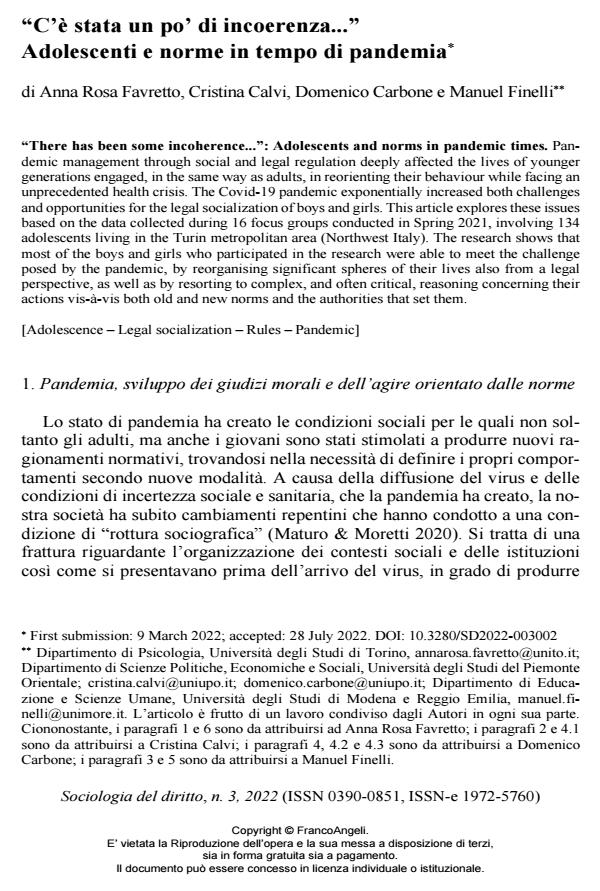"C’è stata un po’ di incoerenza.." Adolescenti e norme in tempo di pandemia
Titolo Rivista SOCIOLOGIA DEL DIRITTO
Autori/Curatori Anna Rosa Favretto, Cristina Calvi, Domenico Carbone, Manuel Finelli
Anno di pubblicazione 2023 Fascicolo 2022/3
Lingua Italiano Numero pagine 25 P. 38-62 Dimensione file 225 KB
DOI 10.3280/SD2022-003002
Il DOI è il codice a barre della proprietà intellettuale: per saperne di più
clicca qui
Qui sotto puoi vedere in anteprima la prima pagina di questo articolo.
Se questo articolo ti interessa, lo puoi acquistare (e scaricare in formato pdf) seguendo le facili indicazioni per acquistare il download credit. Acquista Download Credits per scaricare questo Articolo in formato PDF

FrancoAngeli è membro della Publishers International Linking Association, Inc (PILA), associazione indipendente e non profit per facilitare (attraverso i servizi tecnologici implementati da CrossRef.org) l’accesso degli studiosi ai contenuti digitali nelle pubblicazioni professionali e scientifiche.
Pandemic management through social and legal regulation deeply affected the lives of younger generations engaged, in the same way as adults, in reorienting their behaviour while facing an unprecedented health crisis. The Covid-19 pandemic exponentially increased both challenges and opportunities for the legal socialization of boys and girls. This article explores these issues based on the data collected during 16 focus groups conducted in Spring 2021, involving 134 adolescents living in the Turin metropolitan area (Northwest Italy). The research shows that most of the boys and girls who participated in the research were able to meet the challenge posed by the pandemic, by reorganising significant spheres of their lives also from a legal perspective, as well as by resorting to complex, and often critical, reasoning concerning their ac-tions vis-à-vis both old and new norms and the authorities that set them.
Parole chiave:Adolescence - Legal socialization - Rules - Pandemic
Anna Rosa Favretto, Cristina Calvi, Domenico Carbone, Manuel Finelli, "C’è stata un po’ di incoerenza.." Adolescenti e norme in tempo di pandemia in "SOCIOLOGIA DEL DIRITTO " 3/2022, pp 38-62, DOI: 10.3280/SD2022-003002